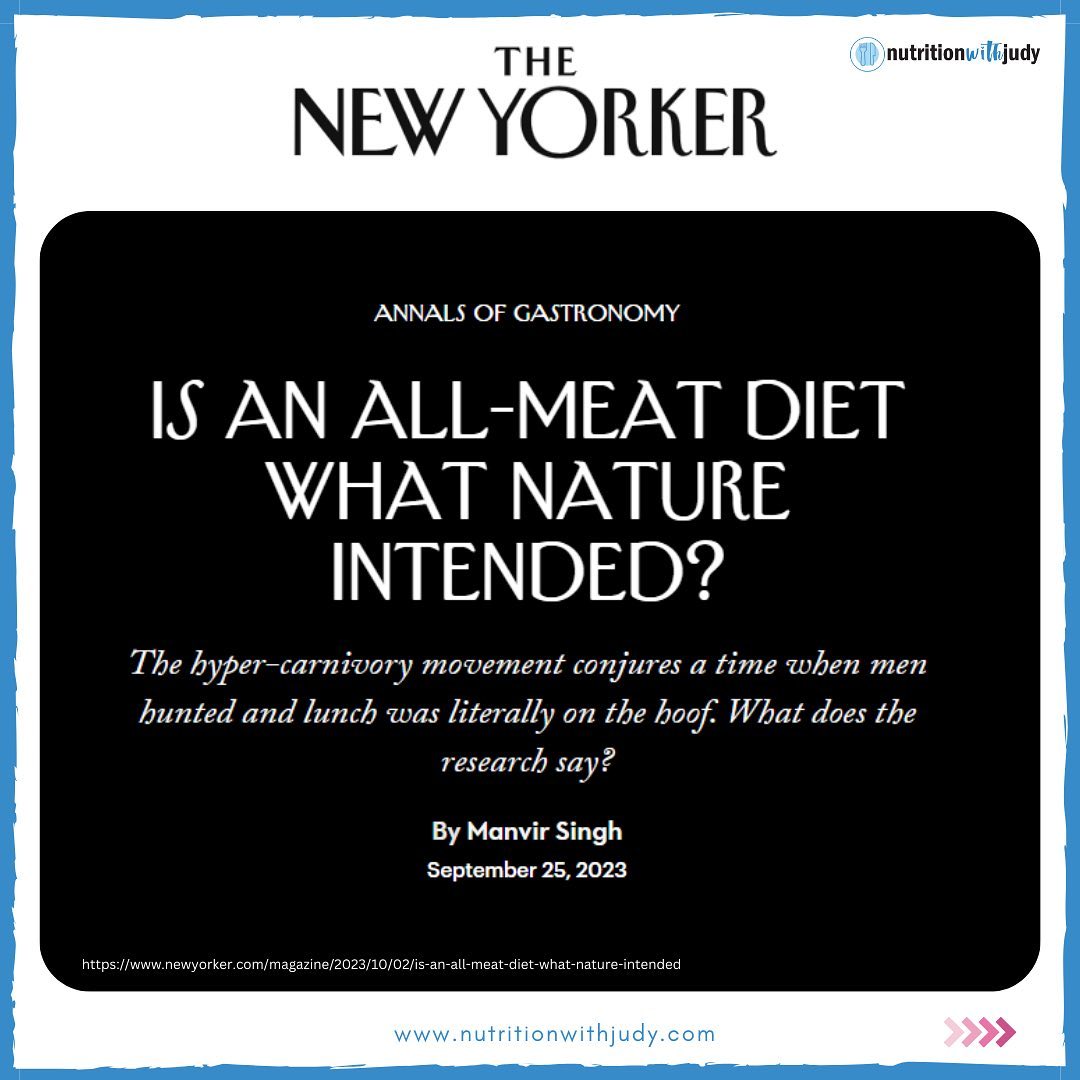

The Carnivore Diet in the New Yorker


More and more mainstream articles on the carnivore diet have been emerging as this powerful modality gains traction. Even with new research supporting the therapeutic potential of a meat-based diet, unfounded criticisms are continually being made. The publisher of my upcoming book, The Complete Carnivore Diet for Beginners: Your Practical Guide to an All-Meat Lifestyle, alerted me that I was mentioned in The New Yorker. Our team was excited until we saw that it could dissuade some of the chronically ill from trying a therapeutic carnivore diet. Let’s take a deeper look and analyze all the statements made in this new article by Manvir Singh titled: Is an All-Meat Diet What Nature Intended?
The Liver King Debacle
The article begins by detailing the quick social media success of Brian Johnson, also known as the Liver King. The Liver King is the owner of Ancestral Supplements, a desiccated organ supplement company, and is known for promoting the nine ancestral tenants to help mitigate conditions and issues stemming from modern-day living. While much of his content is centered around eating meat and many associate the Liver King with the carnivore diet, private emails regarding his actual diet and steroid use were leaked and disclosed in November 2022.
Based on his diet outlined in these leaked emails, not only is his diet not carnivore, but it also isn’t keto, low-carb, natural, or ancestrally consistent. The Liver King also claimed that his physique was all natural and a result of his hard work, diet, and lifestyle, which he has since admitted were lies once confronted with the truth. In mentioning all this, it’s important to understand that the Liver King is considered a larger-than-life unethical avatar in the carnivore community and broader wellness space.
By falsely associating with the carnivore diet, we risk people never hearing about this diet or not taking it seriously. We lose the chance for people to try the healing benefits of proper fatty meat as medicine. The Liver King has many flaws throughout his messaging and his hypocrisy has been highlighted in these leaked emails from organ consumption recommendations to his natural physique. If Singh, the writer of The New Yorker article, dug a bit deeper, they may have realized that the Liver King isn’t the best candidate to include in debunking an all-meat diet.
The Hunter-Gatherer Argument
Singh uses the argument from anthropologist Richard Lee’s findings regarding the Kung and San Bushmen tribes of the Southern African Kalahari Desert. These findings were that two-thirds of their calories were from plants. However, there is much controversy around this topic known as the Kalahari Debate.
While scholars Lee and Irven DeVore, both considered traditionalists or “isolationists”, believe that these hunter-gatherer societies including the Kung and San Bushmen tribes in Southern Africa have been historically isolated and independent hunter-gatherers separate from nearby societies, there are scholars that have an opposing view. These opposing scholars, which include Edwin Wilmsen and James Denbow, are considered revisionists. Wilsem and Denbow argue that these specific hunter-gatherer groups researched by Lee actually arose due to a long period of social and cultural interactions with farmer communities.
Therefore, the diet and lifestyle data collected on these specific hunter-gatherer groups is flawed and not an accurate representation of what a truly isolated foraging society is. These are impactful implications within this context, showcasing the potential flaws of the research conducted by Lee. Even though the arguments made by scholars on the revisionist side are quite compelling, the debate is still ongoing as significant archaeological evidence is required and much work is yet to be completed.
Non-Controversial Hunter-Gather Research
While the jury is still out on whether Lee’s findings can be considered accurate for true hunter-gatherer groups, there are many other well-researched hunter-gatherer groups that support the human evolutionary inclination towards a meat-based diet.
Here are some examples of these hunter-gather groups that thrive on meat-based diets:
- Inuit of Canadian Arctic: Traditionally consumes an animal-rich diet of marine mammals, terrestrial mammals (e.g., seal and caribou), wild birds, and fish.
- Chukotka of the Russian Arctic: Their diet consists of caribou meat, marine animals, and fish.
- Maasai, Samburu, and Rendille of East Africa: These tribes ate diets consisting of meat, milk, and blood.
- Steppe Nomads of Mongolia: The diet mainly consists of meat and milk.
- Sioux of South Dakota: This Native American tribe’s diet consisted mostly of animal foods including large game, small animals, reptiles, fish, shellfish, wild birds, and sea mammals.
- Brazilian Gauchos: Their diet was composed almost entirely of beef.
Lack of Controlled Studies
The next argument made by Singh is that no controlled studies have been made to validate the health claims of the carnivore diet. While this might be true for now, there is a recently published study showcasing the therapeutic potential of animal-based diets for anorexia and a carnivore diet survey study by Harvard. We also believe that examples of real populations eating mostly meat diets for long periods of time offer much more powerful information regarding meat and health compared to conventional scientific studies conducted over short periods of time. In addition to the data discovered regarding the hunter-gatherer groups mentioned above, our clinical work with over 1,000 meat-based clients supports these positive health trends and correlations.
Stay tuned as we work to release self-funded clinical studies on the carnivore diet.
My Rebuttal
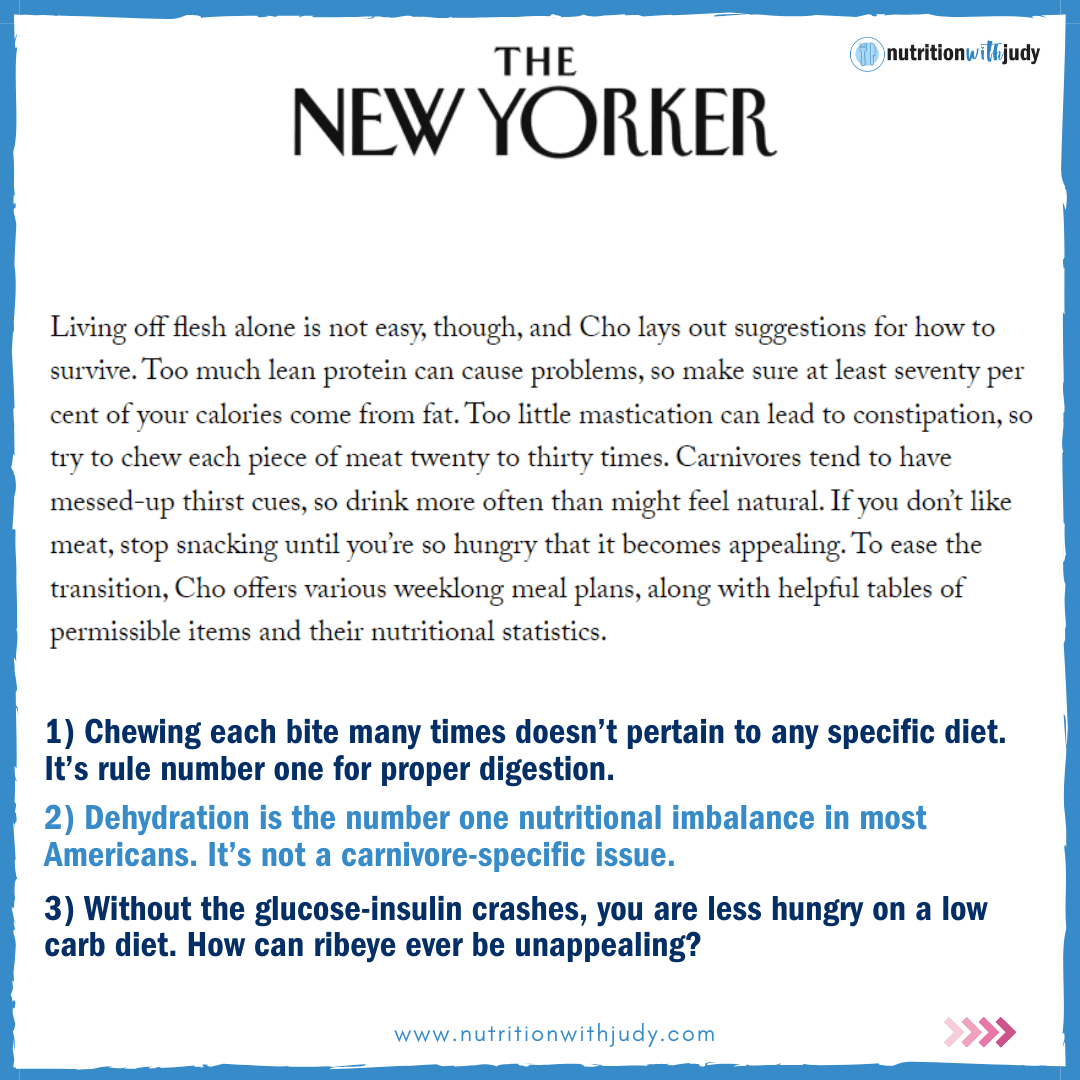

Singh continues to add to his argument by including out-of-context information from me, stating, “Living off flesh alone is not easy, though, and Cho lays out suggestions for how to survive. Too much lean protein can cause problems, so make sure at least seventy percent of your calories come from fat. Too little mastication can lead to constipation, so try to chew each piece of meat twenty to thirty times. Carnivores tend to have messed-up thirst cues, so drink more often than might feel natural. If you don’t like meat stop snacking until you’re so hungry that it becomes appealing. To ease the transition, Cho offers various weeklong meal plans, along with helpful tables of permissible items and their nutritional statistics.”
Unfortunately, most sentences have been taken out of context and strung together in a way to dissuade those from trying the carnivore diet out of complexity alone. Here’s our rebuttal with additional context around each statement:
1. Too little mastication can lead to constipation: This is a true statement for everyone regardless of your diet. Chewing each bite many times for proper mastication is the number one rule for proper digestion and doesn’t pertain to solely the carnivore diet.
2. Carnivores tend to have messed-up thirst cues: Dehydration is the number one nutritional imbalance in most Americans with 75% chronically dehydrated and isn’t a carnivore-specific issue. Additionally, when transitioning to any low-carbohydrate diet, the body requires more electrolyte support temporarily. Individuals who have been on the carnivore diet for three to six months and are still having issues with thirst cues and electrolyte balancing need to look for a deeper root cause issue such as Chronic Inflammatory Response Syndrome (CIRS).
3. If you don’t like meat, stop snacking until you’re so hungry it becomes appealing: Without the glucose-insulin crashes, you are less hungry on any low-carb diet. How can a ribeye ever be unappealing? Those who run into issues of “not liking meat” generally discover that changes in cooking and preparation resolve this concern. There is also a rainbow of meats that individuals can choose from if they happen to not enjoy beef or any other particular variety.
Too Much Protein?
The next argument Singh makes is that since some “meatfluencers” believe that human beings are animals and need to maintain that (e.g., if we eat according to our animal instincts, we will favor meat), biologists David Raubenheimer and Stephen J. Simpson’s new book Eat Like the Animals actually debunks this notion. Singh cites an Oxford study in collaboration with these two researchers stating that locusts always preferred a certain ratio of protein and carbs to further support this argument. Another claim cited by Singh is that Raubenheimer and Simpson found that “protein-loaded diets don’t just age animals; they kill them faster.” The last piece of data Singh incorporates from Raubenheimer and Simpson is that Okinawans in Japan and Tsimane in the Bolivian Amazon both have the lowest incidence of cardiovascular disease ever recorded and consume diets that are just 9% and 14% protein.
Let’s dissect these arguments here:
1. Protein leverage hypothesis: In Eat Like the Animals, Raubenheimer and Simpson created the protein leverage hypothesis based on their various studies. This hypothesis describes how all organisms have inherent protein requirements that they will unconsciously choose to eat until they meet these requirements. If the diet is low in protein, organisms from various species will overeat in order to get as close to the protein requirements as possible. One of the main arguments they make is that ultra-processed foods tend to be low in protein, causing people to overeat these specific foods and this may be responsible for the worldwide obesity epidemic. No arguments here– there is significant evidence showcasing how ultra-processed foods are some of the main drivers of obesity and chronic illness. Singh uses this as an argument against the carnivore diet but we see it as more of an argument for it. Individuals on a carnivore diet generally intuitively eat and don’t need to count macros in order to maintain a healthy weight and body composition.
2. High-protein diets lower mortality: Raubenheimer and Simpson’s research on insects and animals has also made the claim that ingesting too much protein not only ages them but also kills them faster. In a 2014 study, the two researchers stated, “Our sexy, lean mice who ate high-protein, low-carb diets were the shortest-lived of all. They made great-looking middle-aged corpses.” Not only is the wording alone highly biased and strange for a research paper, but more importantly– the carnivore diet isn’t synonymous with a high-protein diet. While some individuals may use a high-protein variation of the carnivore diet short-term for weight loss goals, this is actually something we recommend against for the long term. Carbs are the only non-essential macronutrient for humans. Since the full parameters of the study aren’t disclosed, we have to wonder: 1) What is the natural species-appropriate diet for mice? Is it really the same as humans? 2) What exactly were they fed and underfed? What were the specific macros? 3) What controls did they have in place for the study? Is it possible any other factors played a role in the shortened lifespan? It’s possible these mice lived shorter lives if they were not given enough fat to compensate for their low-carb diet, leading to rabbit starvation or protein poisoning. High fat intake is a must for all ketogenic and low-carb diets since lean meats provide protein as a building block but don’t include enough fat required for an energy source. We’ve heard the argument made that high-protein diets can be bad for the kidneys, but we’ve debunked these arguments too– you can read more here.
3. The Blue Zones debate: The Okinawans and Tsimane populations belong to the Blue Zones which have been used by the World Health Organization (WHO) to persuade the world that a plant-based diet is better for longevity and lower instances of chronic illness. However, there are many criticisms of the Blue Zones theory. A recent study discovered fraud and data error throughout the regions, drastically impacting the actual life expectancy statistics. For instance, Okinawa, which is famous for having extreme longevity and was cited in this New Yorker article, actually has the shortest average lifespan in the country based on statistics from Japan. One study pointed out that the “current demographic and nutritional data suggest that the remarkable Okinawan longevity is now a phenomenon of the past.” Other criticisms around the Blue Zones include that there isn’t any evidence supporting the direct correlation between diet and longevity– there are likely other lifestyle factors that may be responsible for longer lifespans.
Is Lack of Diversity to Blame?
Singh continues by addressing that perhaps the carnivore diet is a product of the modern diet crisis. Singh cites writers Taras Grescoe and Dan Saladino’s hypothesis that a collapse of diversity in the human diet is actually to blame for modern illnesses. One of these claims mentioned is that “as a species, humans once ate thousands of plant foods, but only a hundred and fifty are cultivated at scale for food today, three of which– rice, wheat, and maize– constitute 50% of all calories.” We couldn’t find any citations for this specific claim that humans once ate thousands of plant foods.
Even if that was the case, there are many compelling arguments about how essential meat has been in the human diet historically and that plant foods were generally seen as survival foods when there was no meat available. The lack of diversity argument isn’t backed by any scientific evidence.
Singh also dismisses the impact of excess seed oils, carbohydrates, and plant-defense chemicals on modern health. We’ve covered these topics in-depth, you can read more by clicking each corresponding link in the text above.
The Sustainability Debate
Singh uses Alicia Kennedy’s argument as a part of the sustainability debate, stating, “Their argument comes down to an ecological observation: it takes about a hundred times more land to produce a calorie of lamb or beef than it does to produce a plant-based alternative.” While Singh does mention that members of the carnivore community often respond to this by blaming environmental devastation on factors such as grain monocultures and crop-driven deforestation, Singh dismisses this notion by stating that “some 80% of farmland is used for livestock feed.”
Singh should do more research. Context matters. The land use of 80% is a narrative-driven explanation. The United Nations Food and Agricultural Organization (UN FAO) shares that 77% of livestock land includes grazing land. Let’s do the math. If the total habitable land of the Earth is 71% and 46% of that is agricultural land, that means that only 32.66% is habitable. Since 77% of the agricultural land is livestock land which includes grazing, only 25.15% of the total habitable land is livestock land. So if 25.25% of the total habitable land is livestock land which includes grazing land, that means it only accounts for 13% of all land. No, 77% of farmland is not used for livestock feed– the land includes grazing and other mixed-use lands. This 77% is also a subset of a subset of a subset of land.
Why Are They Pushing This Narrative?
Even though these livestock land statistics are directly from the UN FAO, there seems to be a potential conflict of interest. In 2013, the UN FAO released a 201-page document as to why the world needs to eat more edible insects. The foreword of this document states, “It is widely accepted that by 2050 the world will host 9 billion people. To accommodate this number, current food production will need to almost double. Land is scarce and expanding the area devoted to farming is rarely a viable or sustainable option… Inefficiencies need to be rectified and food waste reduced. We need to find new ways of growing food. This publication has its beginnings in an effort in FAO’s Forestry Department to recognize the traditional practices of gathering insects for food and income, and to document the related ecological impacts of forest habits…”
Is land really scarce? What goes into the 77% of farmland? A lot more than land that’s supposedly solely used up by cows as this is a subset of a subset of a subset in order to make the number look significantly larger.
Per the UN FAO, 77% of agricultural land used for livestock includes both grazing land for animals and arable land used for animal feed production. If you look up the definition of “arable land”, you’ll find that this is defined as any land capable of being plowed and used to grow crops. That means that the arable land included in the 77% can be used for animal feed but doesn’t specify, if in reality, that this arable land is exclusively used for animal feed. With all the conflicting information and narrative-driven campaigns made by the UN FAO, it begs the question– how much land is truly dedicated to raising livestock?
Replacing meat for insects is being pushed as a healthy alternative to save the planet. We debunk all the arguments for edible insects as a meat replacement here. Not only has the UN FAO released a 2023 report stating that meat, eggs, and milk are essential for humans, but it also released a publication in 2021 detailing various biological food safety hazards associated with edible insects. The organization seems to have a history of releasing conflicting information– we can only guess that this is due to certain information being scientifically backed while other information is narrative-driven.
The Classic Right-Winged Nationalism and Toxic Masculinity Smear
We often don’t speak on politics as we find both parties corrupt but as more narrative-driven articles somehow correlate meat consumption, seed oil concerns, and fitness with being right-winged, it’s important to discuss this within the context of Singh’s article. Singh uses the Raw Egg Nationalist as another reason to discredit any health claims associated with animal food products due to the nature of this figure being controversial. Singh labels the Raw Egg Nationalist as a “right-wing conspiracy theorist” based on the type of content he posts, stating that his solution “aligned nationalism and masculinity.” Even if there is any truth behind this figure being right-ringed and looking into what the mainstream deems as “conspiracy theories”, ultimately, this isn’t a science or data-backed argument against the carnivore diet. It’s simply emotionally driven and meant to incite a non-logical reaction from the readers.
Singh continues to correlate meat consumption with masculinity through the conclusion of this article, making statements like, “Because meat is linked to manhood, carnivory promises a way to pump up a shriveled birthright.” The author makes the argument that this is the reason why the Liver King took this marketing approach with the goal of attracting “endangered men”.
Making meat, a fundamental source of nutrients required by all humans, correlated to toxic masculinity and the far-right screams propaganda.
Is the Carnivore Diet Just Another Fad Diet?
Singh closes the article by giving a quick history of successful fad diets from the past half-century, explaining that “fad diets are perfectly manufactured to spread. They appeal to dissatisfaction. They provide crude explanations for why things are going wrong. And they tap into an intuitive logic at the center of spiritual traditions– that the greater the sacrifice, the greater the redemption. Yet fad diets also doom themselves. The same features that fuel their popularity– their quick-fix nature, their severe and often harmful restrictions– are what make them unsustainable for many.” No arguments here on fad diets but the carnivore diet is far from just another fad diet.
Singh uses Joe Rogan and Paul Saladino who both eat fruit with their “carnivore diets” and the Liver King who eats potatoes and maple syrup openly while espousing a nose-to-tail diet as proof that “even meatfluencers struggle to resist the pull of plants.” Rogan has never claimed that his current diet is the carnivore diet and eats only meat and fruit during the month of January for World Carnivore Month. In recent podcasts, Rogan describes his diet as mostly centered around meat. Saladino is a more complicated example requiring context as he now advocates for an animal-based diet that includes fruit and honey since the carnivore diet didn’t “work” for him. Saladino opted to add fruit and honey back into his diet after experiencing low testosterone and electrolyte imbalances rather than looking for deeper root causes. As we mentioned at the very beginning of this article, the Liver King doesn’t eat a carnivore diet and shouldn’t be a part of this equation at all.
Closing Thoughts
With all this in mind, do you think this is an accurate representation of the carnivore diet? Or are many of the arguments used out of context and even borderlining propaganda? And, what about the author, Manvir Singh? He’s never written or researched about diet, wellness, land use, or nutrition. Yet, he gave us his expert opinion. We’re always open to friendly debate and discussion when supported by clinical evidence and scientific data. However, this article is heavily biased, helps push the mainstream narrative, and doesn’t use the facts within context.
Work With Our Trusted Carnivore Diet Functional Nutritional Therapy Practitioners
The Nutrition with Judy practice is honored to be a trusted carnivore diet practitioner support serving clients from around the globe. We’re passionate about helping our clients achieve root-cause healing in order to lead the best quality of life possible that’s nearly symptom-free. Our team is dedicated to educating our community about the incredible benefits of the carnivore diet. We welcome you to explore our free resources and are always available to support you through personalized protocols. Our Symptom Burden Assessment (SBA) is the perfect starting point for discovering your root cause and is required to work with our team— you can learn more in-depth about this powerful tool here.
Start your root-cause healing journey today and contact us any time with any questions or concerns.
DISCLAIMER: This content is for educational purposes only. While we are board-certified in holistic nutrition and are nutritional therapy practitioners, we are not providing medical advice. Whenever you start a new diet or protocol, always consult with your trusted practitioner first.


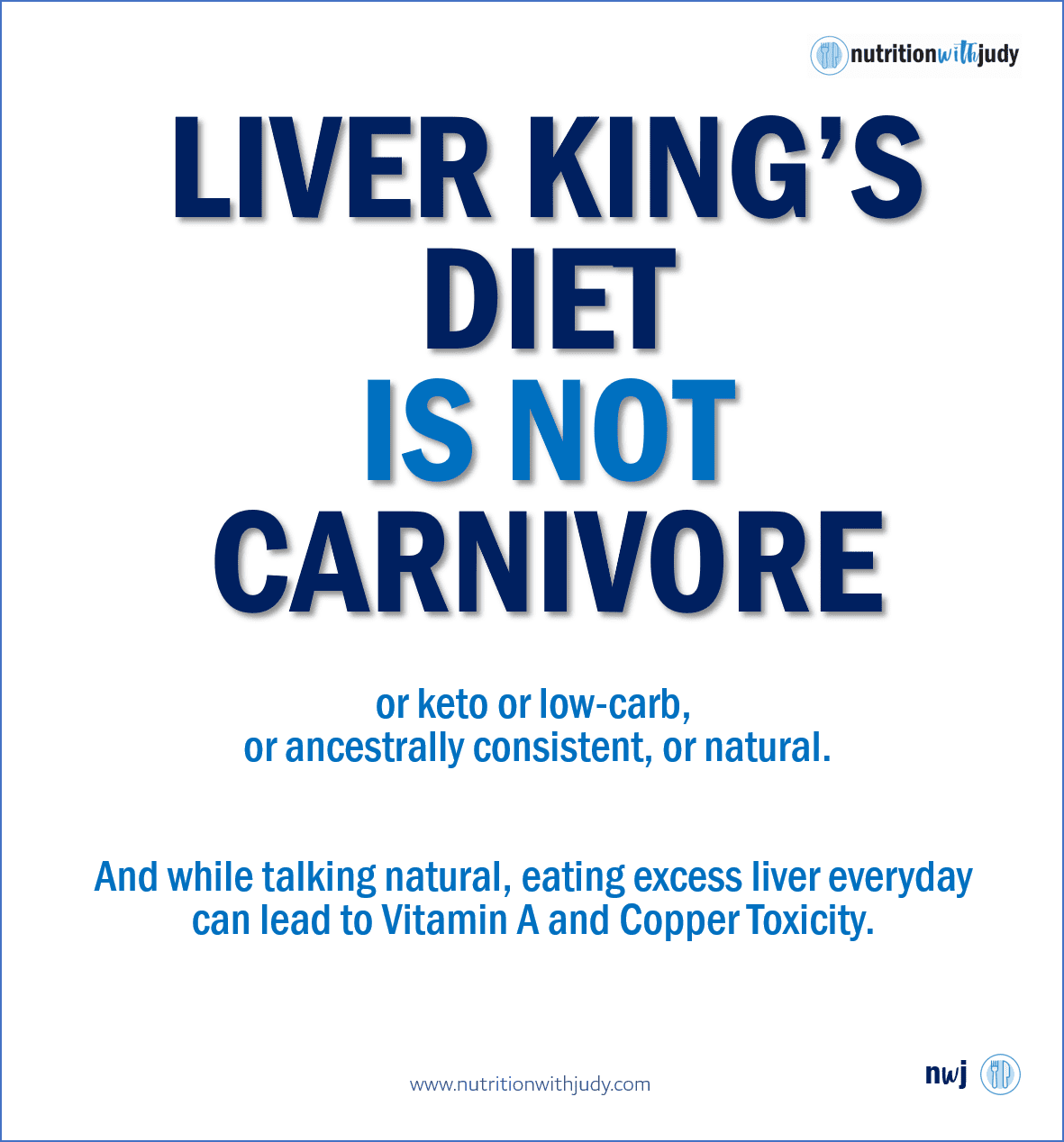










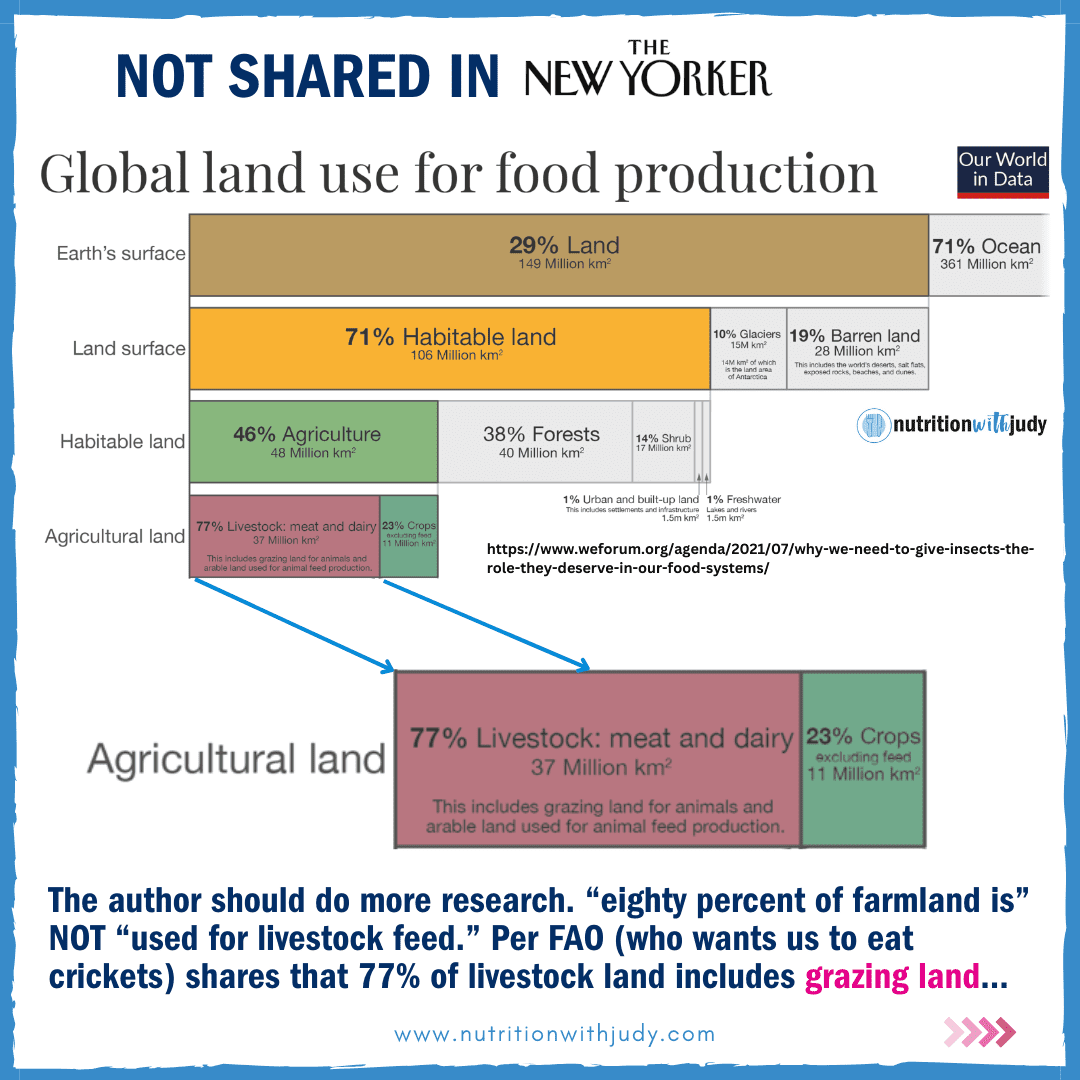
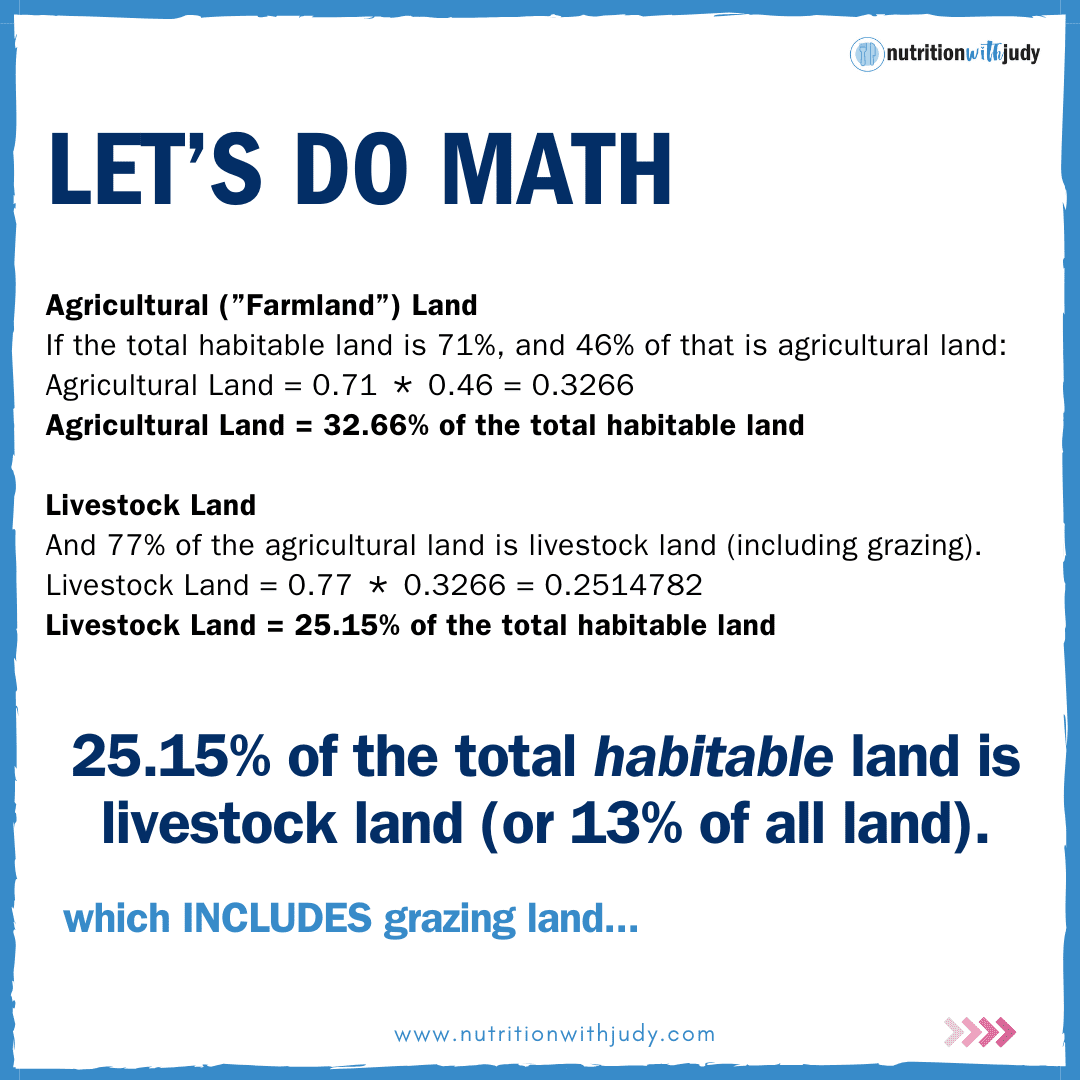
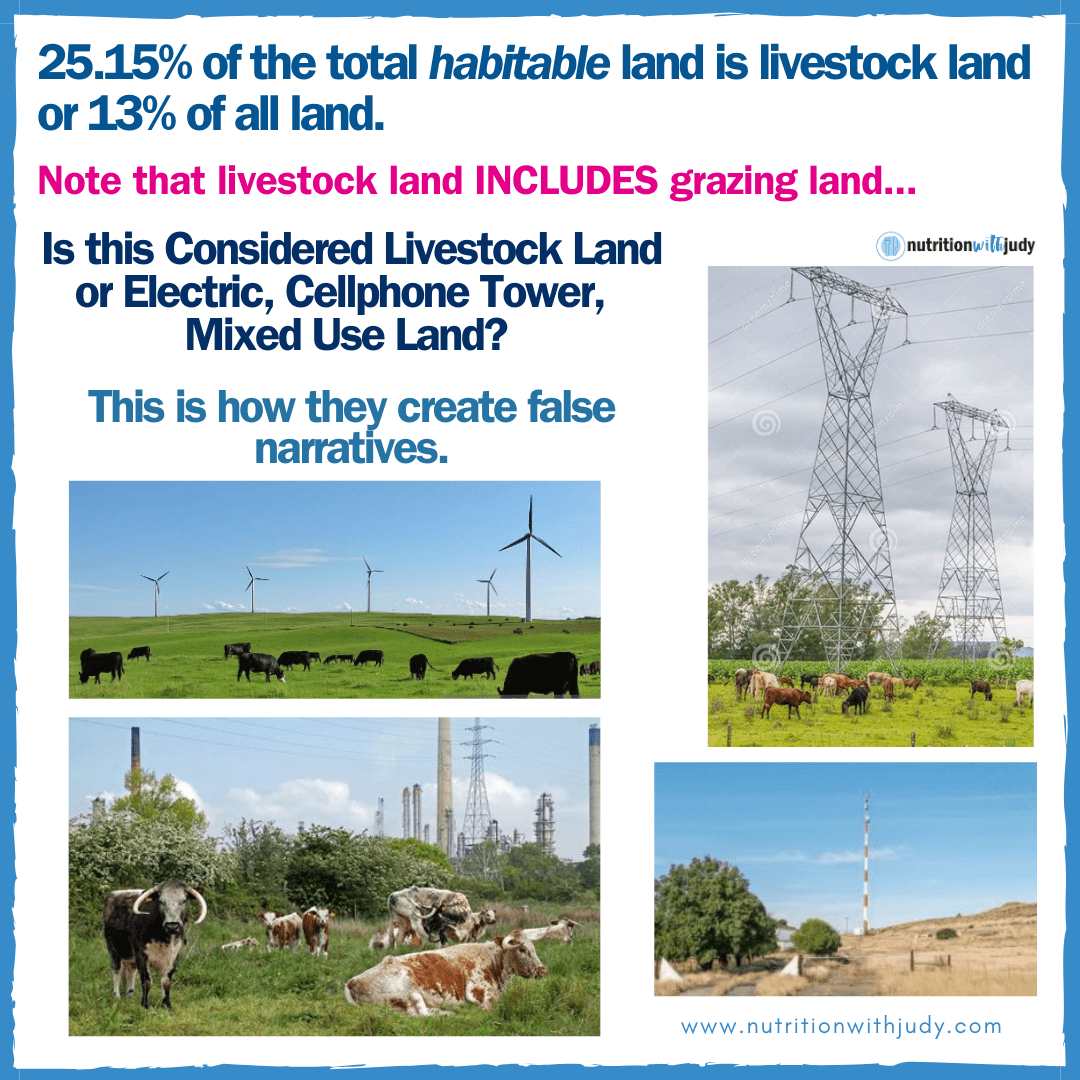
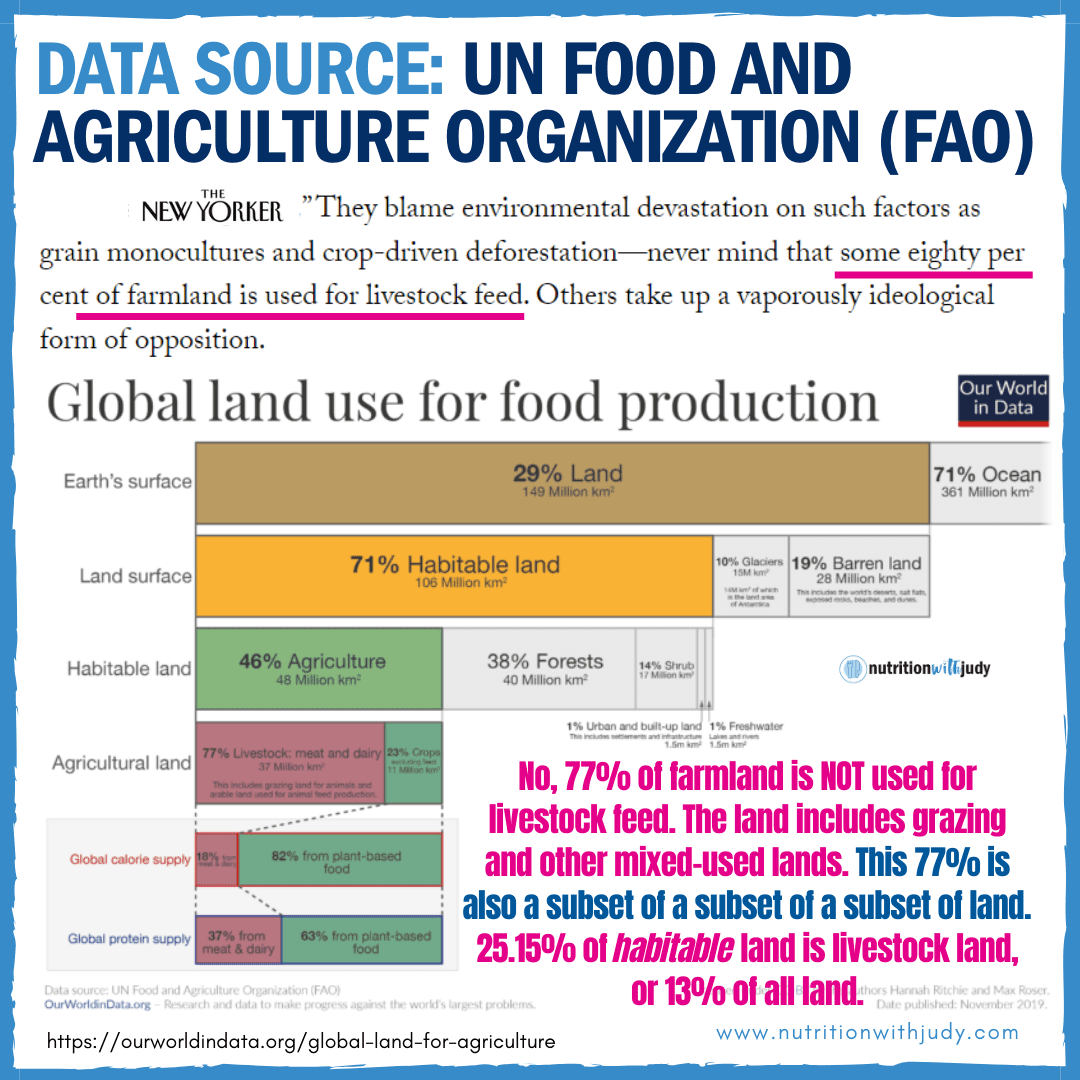
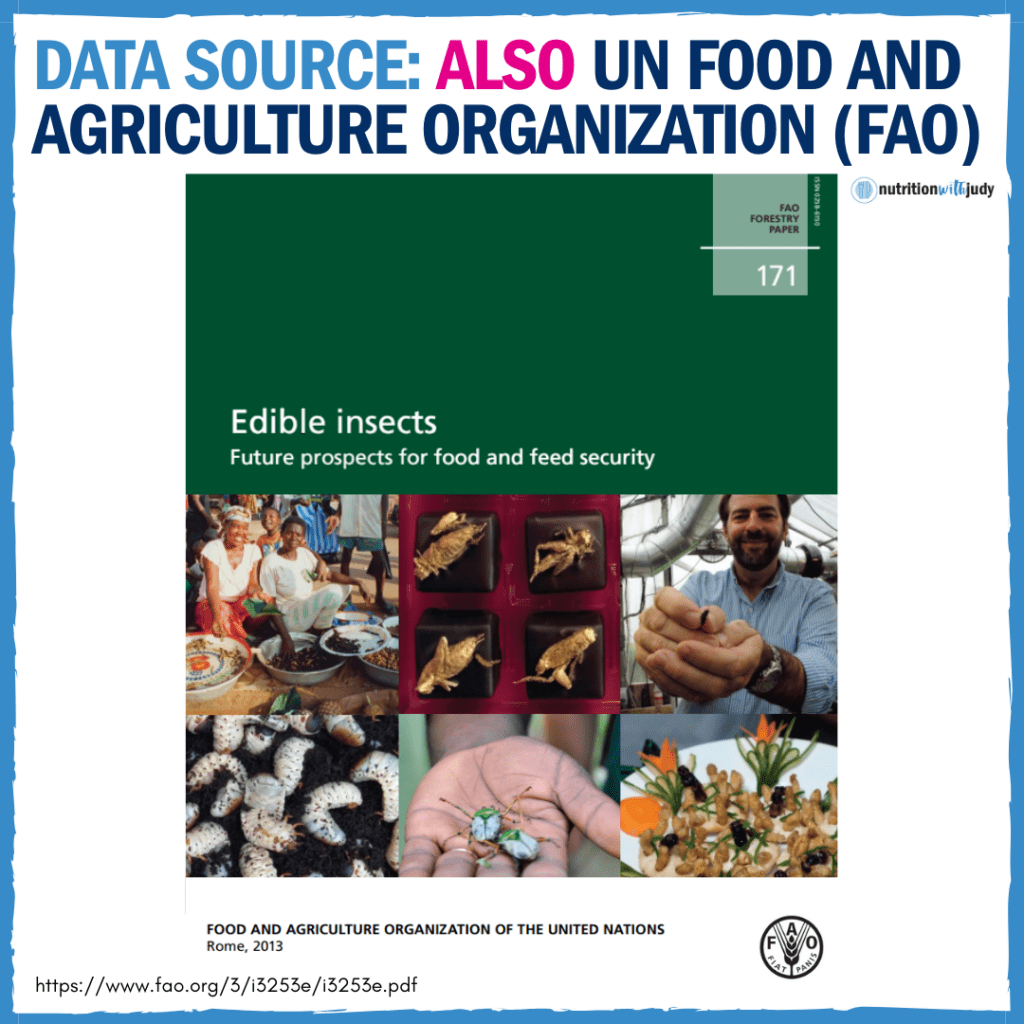
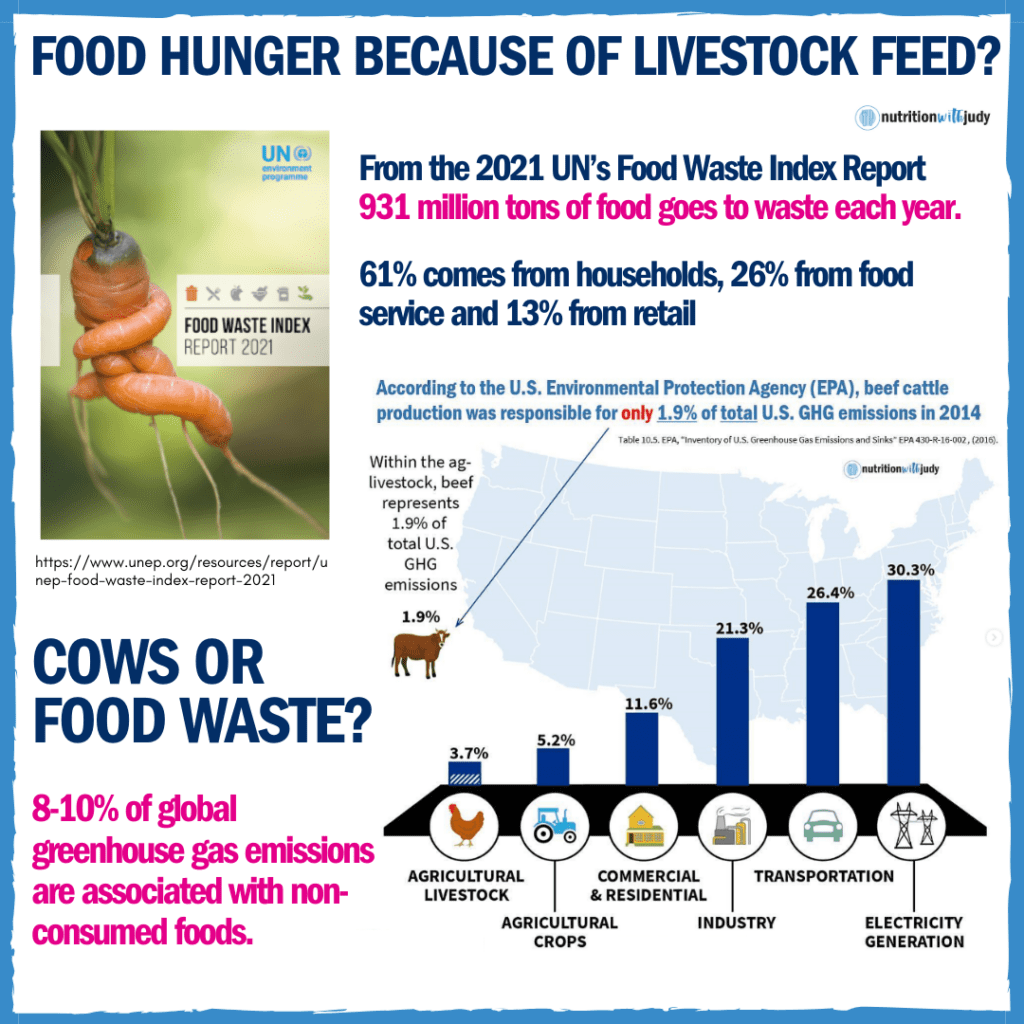


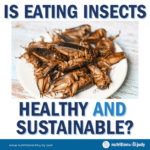
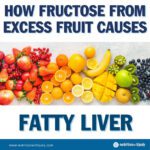
Glenys
October 10, 2023 at 4:34 amLove this come back! Very precise. I hope he looks into all the links you have provided. It will be interesting to see if he comes back with a response.
Susana Xhayet
October 15, 2023 at 10:44 amThank you Judi, you could say it louder, but not clearer!! You are an inspiration and keep debunking every biased theory. I can understand how all this is very difficult for people to believe, it was for me. Only working with people and seeing evidence and results, made me believe it. I wish I had this knowledge before, that would have saved my sister’s life. But we can not change the past, and have made my purpose to not let this happen in the future if I can help it. Thank you again!!
annie becker
October 23, 2023 at 11:23 amIn my undergrad, I had friends that are Masai. They Kenyan Masai have eaten Carnivore for hundreds of years. So my friends had a super hard time in the US, because their normal diet really was Milk, Blood and meat. They drank the Milk raw and warm, so cold was really hard and no raw in a college town. Fresh blood wasn’t even an option (and the Masai found babies have to be started on blood, in order to drink it when older or there are lots of problems) So he was left with meat and people always commented on his meat diet. But he could still regularly run 1/2 marathons with only 2/3 of his normal diet…in Africa normally he ran 1/2 marathons to see his family each week… as he work for National Geographic at the time and they lived out in the bush. I wish that I had tried his diet of meat at the time, but was believing the vegan lie when I could have been as healthy as he was on his carnivore diet!
Jeanmarie Todd
November 8, 2023 at 6:25 amThank you for your excellent work, Judy! I’ve tried to access the New Yorker article so I can respond to them directly to let them know how disappointed I am in Singh’s hack job but I don’t currently have a subscription. This is below the quality of journalism one can usually expect from the New Yorker. When people’s biases are involved, their standards inevitably slip.